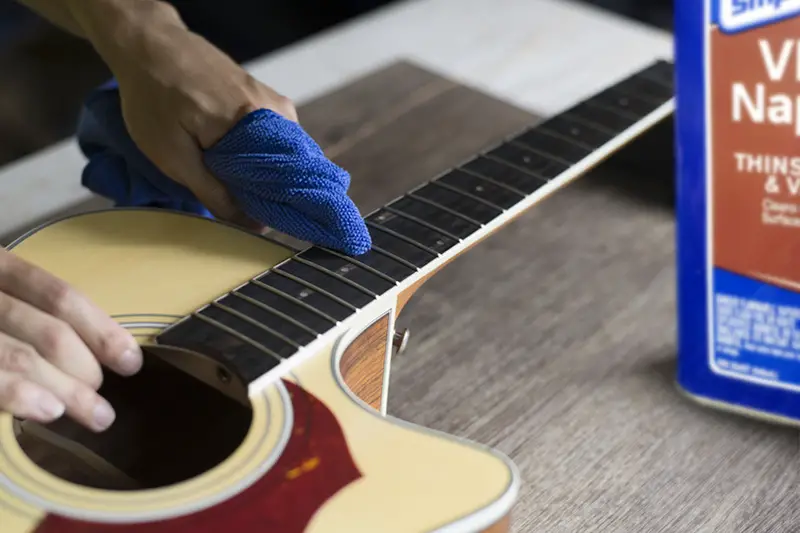There are a plethora of products that are made for cleaning your guitar. From wipes, pastes, and liquids to two-in-one cleaner and polishes, there is a virtual forest of products to navigate. But what is the best guitar cleaner to use for cleaning your guitar? It comes down to preference and what you are trying to achieve.
The best guitar cleaner for well-played guitars is naphtha, which is a strong solvent that is effective for cleaning oils, breaking them down and allowing their removal with little effort. For the occasional guitar player who maintains their instrument, a good guitar polish will protect and keep the guitar shiny.
Naphtha (pronounced naf-tha) can be picked up at just about any paint, hardware or construction store. Or, you can pick up this 2-pack online. For guitar polishes, we recommend either Kyser’s Wood Polish For Instruments or Dunlop’s Guitar Polish & Cleaner.
As a guitar repair technician (luthier), I can tell you that many musicians do not follow a frequent cleaning routine and many of the instruments that come to me are as filthy as Jim Morrison’s leather pants. For these guitars, I use naphtha.
However, there isn’t just one and every musician has different preferences based on their needs, styles, environment and lifestyle. A strong solvent such as naphtha is very effective for someone who plays vigorously, sweats a lot and smokes, yet it might be overkill for a classical guitarist who maintains a strict cleaning routine.

What guitar cleaners do I use?
Most of the guitars that come into my shop need a good and thorough cleaning. The guitars I see are typically one of two types. The first category is guitars that belong to guitarists who play often and need their guitars fixed or upgraded. These guitars get played a lot and frequently in smokey bars by sweaty guitarists. The other type I see are instruments that have been neglected in a garage or closet and have accumulated a thick layer of dust. This dust combined with humidity and temperature changes can turn it into difficult to remove marzipan.
For these types of jobs I use naphtha to loosen up the oils and dirt so it can be easily wiped away. WARNING!: Naphtha is a petrochemical and is extremely flammable and it is not a coincidence that the name is very close to the word napalm, as they both contain naphthenic acid. It must be used in a well ventilated area away from open flame.
Naphtha is a solvent used to dilute crude oil that is too thick to flow so that it can be more easily pumped through pipes. Those same properties mean it does an excellent job of breaking down the oils that the human body secretes, allowing them to be easily removed from your guitar. It evaporates almost immediately so it will not harm wood or finish and leaves no residue on your guitar.
 What you will need:
What you will need:
- Two clean, dry cloths or lint free paper towel
- Naphtha
Steps for cleaning your guitar with naphtha:
- Place one dry cloth securely over the opening of the can of naphtha.
- Tip the can upside down and let a little bit of the naphtha soak into the cloth.
- Use the wetted area of the cloth to wipe down the guitar.
- Pay extra attention to the areas where skin comes into contact with the guitar like the neck and lower bout of the body. This is where sebum (oils excreted from skin) tends to accumulate.
- Finish by wiping the entire guitar down with the other clean cloth.
I like to follow this cleaning by applying to the finish a small amount of paste wax (Renaissance is my go to) or even an auto polish (I like Mother’s). I rub it in with a very soft, lint free cloth, let it dry for a few seconds and then wipe it off to bring out a freshly polished, bright finish.
Because I do guitar repair as my side hustle, I tend to have to do heavier cleaning and naphtha may be a stronger product than most will likely need. For many, routine cleaning and a 2-in-1 cleaner and polish will be more than sufficient.
How to do routine guitar cleaning:
What you will need:
- A clean, dry, lint free cloth
- A few seconds of time
You can use any type of lint free cloth ranging from a square cut from an old t-shirt to a high quality microfiber cloth. Just make sure it is clean, dry and free from anything that might scratch or harm your finish.
- With the clean, dry cloth, wipe the back, sides and top of the guitar.
- Wipe the headstock and neck.
- Repeat every time before and after you play to keep your guitar looking its best.
By maintaining this cleaning routine, it helps prevent oils, skin, dander, sweat and other fluids from drying and building up on your guitar. This lessens the need for and frequency of heavier cleaning. This routine helps keep your guitar clean and shiny, but time and use will start to dull the luster of your finish and grime will eventually build up, especially in the harder to clean areas around hardware and under strings. There will come a time you will need to use a cleaner and polish on your guitar.
Which guitar cleaner and polish to use?
There are almost as many brands of guitar cleaners out there as there are guitar brands. Martin, Gibson and Fender each have their own blend that can typically be purchased at your local music store and certainly on Amazon. Dunlop has a line of several very good cleaners and polishes to meet just about any guitarist’s needs. Some are marketed specifically for acoustic guitars, electric guitars and/or classical guitars. Many are just mineral oil with a very small amount of other ingredients to differentiate them from the competition. Others are wax free, or contain carnauba. Some are free of harsh chemicals. If you have a preference and a need there is a cleaner and polish to meet them.
These products are very easy to use and typical only require the following steps:
- Apply a small amount of polish to a cloth (if a pump spray apply a single pump to the cloth. Never spray directly on your guitar as you have no control over the spray getting on strings, exposed wood, or hardware)
- Wipe down your guitar
Done and done! Others have even simplified it a step further making a disposable, treated cloth that you use once and then toss the soiled cloth in the bin.
I personally like to use Kyser’s Wood Polish on my instruments. I maintain a cleaning routine of wiping my guitars and other instruments down before and after every use and typically don’t need to do heavier cleaning. Kyser’s Polish is reasonably priced and works very well. In 25 years I’ve never needed a different product for routine polishing of my instruments.
If you are on a budget or don’t like the feel or smell of the store bought cleaners and polishes rest assured that none of them are absolutely necessary. These products typically make the job easier and provide some added benefits like resisting stains and grime. At the end of the day, a little warm water and dish soap on a dry cloth will clean your guitar just as well, however, it may take a little bit more elbow grease and will not resist dirt.
In conclusion
Every guitar player is a different breed of cat and each has different needs and preferences. I recommend trying as many different brands and types of cleaners as possible. Ask other guitarists what they use. Ask if you can try a spritz of their brand and see what you think of it. Just as with strings, you may have to try several before you find the one that you will stick with for the next 25 years.


